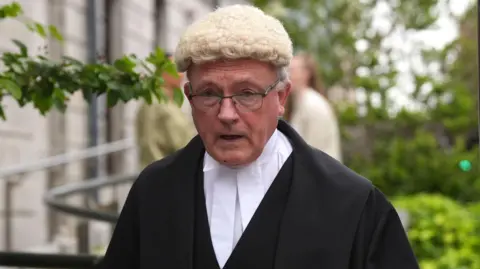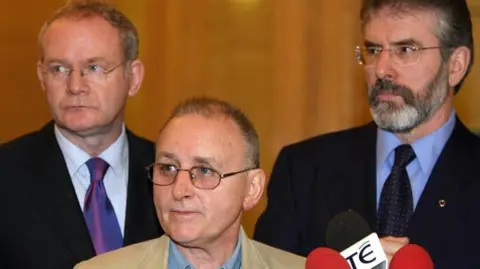Gerry Adams awarded €100k in libel case against the BBC
Gerry Adams has won €100,000 (£84,000) in damages over a BBC story about the murder of a British agent.
A court found the former Sinn Féin leader was defamed in a BBC NI Spotlight programme broadcast in 2016 and an accompanying online article, in which an anonymous contributor alleged he sanctioned the 2006 murder of Denis Donaldson.
Mr Adams, 76, denies any involvement.
He said taking the case "was about putting manners on the British Broadcasting Corporation".
In a statement on Friday, the Donaldson family called for a public inquiry into the murder, adding they have been "stonewalled" while the libel case carried on.
The legal bill for the case is believed to be between €3-5 million (£2.5-4.2m), according to sources with knowledge of the case.
It is understood to have been one of the most expensive cases the corporation has ever fought.
The head of the BBC in Northern Ireland said the implications of Mr Adams' court win were "profound".
Adam Smyth, director of BBC NI, said its legal team had warned the jury's decision in the high-profile case could "hinder freedom of expression".
The trial at the High Court in Dublin heard four weeks of evidence from 10 witnesses, including Mr Adams and BBC NI reporter Jennifer O'Leary.
The jury found words used in the programme and accompanying article meant Mr Adams sanctioned and approved Mr Donaldson's murder.
They also found the BBC did not report the allegations in good faith and settled on €100,000 in damages.
The 11-person jury came to its findings after six hours and 49 minutes of deliberations.
Speaking to reporters, Mr Adams thanked the court and said he was "very mindful" of the Donaldson family in the course of the trial.
"I know many, many journalists. I like to think that I get on well with most of them and I wish you well and I would uphold your right to do your job," he said.
"But the British Broadcasting Corporation upholds the ethos of the British state in Ireland and, in my view, it's out of sync in many, many fronts with the Good Friday Agreement.
"It hasn't caught on to where we are on this island as part of the process, the continuing process, of building peace and justice and harmony and hopefully, in the time ahead, unity."
Mr Adams' solicitor, Paul Tweed, called the allegations against his client "totally untrue and defamatory".
"The BBC Spotlight team should not have included it in their broadcast," he told reporters.
"Our client is very pleased with this resounding verdict and award of damages which speaks for itself."
The fact the "false allegation has been left online for nine years" had "undermined the high standards of accuracy that is expected at the BBC," Mr Tweed said.
"It begs the question whether there has been any political or outside pressure on the BBC to take the stand they have taken."
The BBC had argued a defence of fair and reasonable reporting on a matter of public interest.
Speaking outside court, the director of BBC NI said he was disappointed.
"We believe we supplied extensive evidence to the court of the careful editorial process and journalistic diligence applied to this programme and accompanying online article," said Mr Smyth.
"We didn't want to come to court, but it was important that we defend our journalism and we stand by that decision.
"Of course, a case of this importance, duration and complexity involves significant expense.
"In common with other media organisations the BBC, has insurance and makes financial provision for ongoing and anticipated legal claims."
BBC NI Spotlight reporter Jennifer O'Leary thanked the legal team involved in "defending the BBC's journalism", and the BBC's witnesses in court.
"I said in the witness box that I had nothing to hide, only sources to protect, and I want to thank them for trusting me," she said.
Blocked BBC witnesses
Mr Justice Alexander Owens blocked three people appearing as witnesses, including Denis Donaldson's daughter, who the BBC wanted to call to testify.
However, the judge ruled what she intended to say was irrelevant in respect of what the jury had to consider.
The BBC also wanted to call Austin Stack, whose father Brian, a prison officer, was fatally wounded in an IRA gun attack in Dublin in 1983.
It also attempted to call Eunan O'Halpin, a professor of contemporary Irish history at Trinity College, Dublin.
 PA Media
PA MediaWho was Denis Donaldson?
Denis Donaldson was once a key figure in Sinn Féin's rise as a political force in Northern Ireland.
He was found murdered in 2006 after it emerged he had worked for the police and MI5 from inside Sinn Féin for 20 years.
In 2009, the Real IRA said it had murdered him.
Mr Donaldson's daughter said the murder and surrounding circumstances have "devastated" the family.
In a statement issued on Friday Jane Donaldson said the family "supported neither side" in this case, and she criticised the court for not allowing her to testify.
"The jury heard sensitive, privileged family information tossed around without our consent, but did not hear my testimony," she said.
She also criticised Mr Adams.
"By reducing events which damaged our lives to a debate about damage to his reputation, the plaintiff has trivialised our family tragedy," she said.
"The plaintiff prioritised his own financial and reputational interests over any regard for retraumatising my family."
 PA Media
PA MediaMr Adams was the leader of republican party Sinn Féin from 1983 until 2018.
He served as MP in his native west Belfast from 1983 to 1992 and again from 1997 until 2011 before sitting as a TD (Teachta Dála) in the Dáil (lower house of Irish parliament) between 2011 and 2020.
Mr Adams led the Sinn Féin delegation during peace talks that eventually brought an end to the Troubles after the signing of the Good Friday Agreement in 1998.
He was detained in the early 1970s when the government in Northern Ireland introduced internment without trial for those suspected of paramilitary involvement.
Mr Adams has consistently denied being a member of the IRA.
Why was the trial in front of a jury?
Jury trials are usually longer – and therefore more expensive – than those held in front of a judge acting alone.
The Republic of Ireland is in the process of overhauling its defamation laws, including the elimination of jury trials in High Court defamation cases.
In Northern Ireland, there has been "a presumption against jury trials" in libel cases since 2022.
